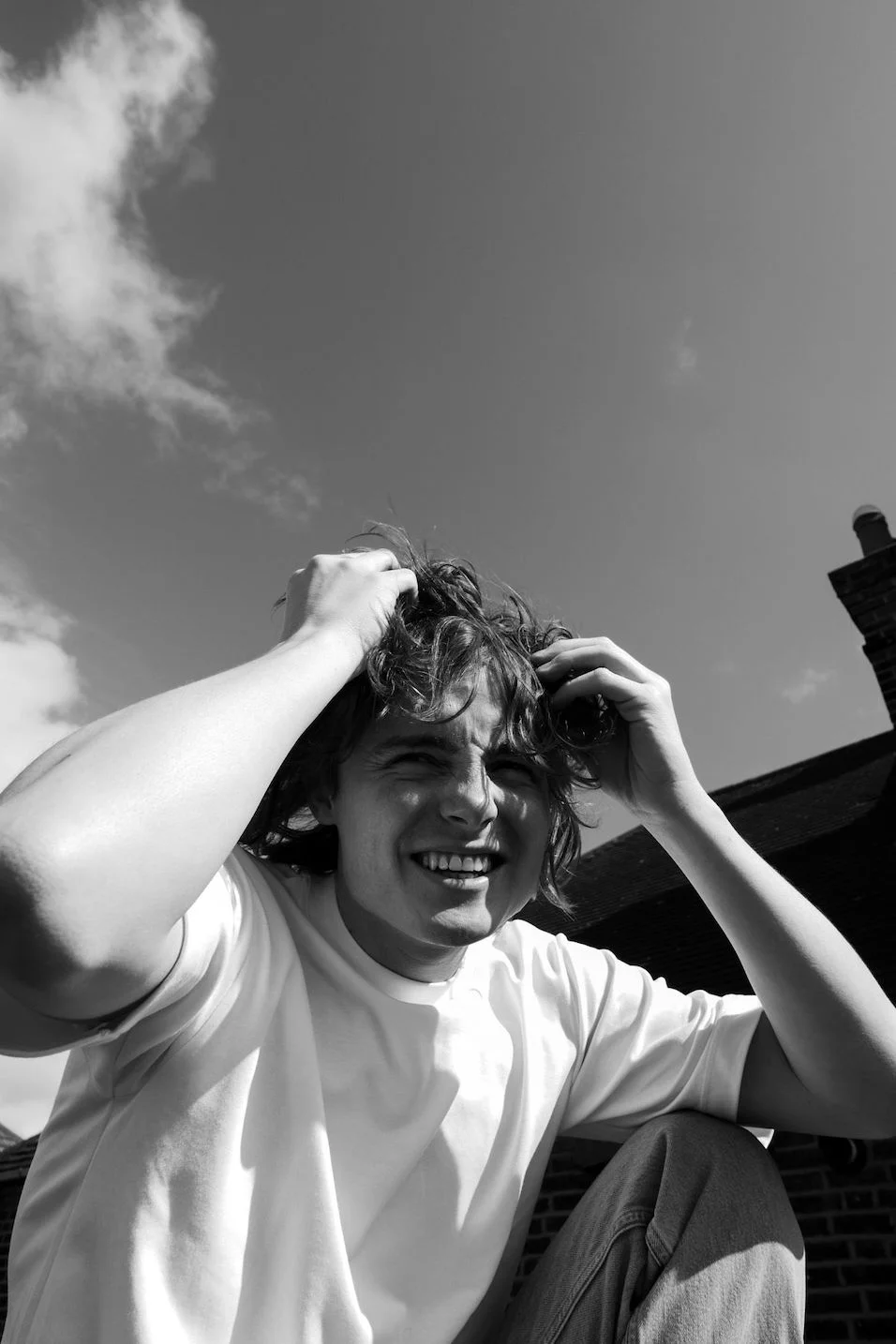
James Smith
With the release of his latest singles, James Smith continues carving out a space for himself among the singer-songwriter greats: who write with soul and tap into something timeless through their music.
The first thing you must get straight about James Smith is that he’s tired of being defined by his past: specifically, as the Season 8 finalist on Britain’s Got Talent. That was back in 2014, when Smith was a budding musician at the age of 15 — still shy behind his guitar and covering songs by icons such as Nina Simone and Gnarls Barkley. Now, James Smith is 24, has over 300 million streams on Spotify, and is adored worldwide thanks to his own tear-jerking ballads like “My Oh My” and charming online personality (he’s quite the goofball on TikTok). James Smith is looking to the future — one that appears, by all accounts, magnificent.
Smith’s most recent releases include the singles “Common People” and “Introverted.” While the former is an ode to a simple lifestyle surrounded by pure-hearted people (Smith was raised by a taxi driver mom and market trader dad around Upton Park, East London), “Introverted” is perhaps Smith’s intervention with his younger self. “You don’t have to be high to get by / You’re good as you are,” the lyrics urge. “Tell all the people you love how you feel.”
In an industry where everyone tries to one-up each other with flashy music videos that cost millions to produce and overly curated social media pages which indicate a kind of “battle of the egos,” James Smith is trying to stay true to the music itself — and the very reasons he fell in love with it in the first place, when he picked up a guitar at nine years old.
In a conversation with 1883’s Stacia Datskovska, this singer-songwriter (who makes the kind of songs you’d want to belt out in the shower with an imaginary microphone, or else listen to on a packed subway while romanticizing your life) gets candid about everything from his people-pleasing past and his dream Ed Sheeran collab to his journaling habit and the one fan encounter he won’t ever be able to forget.

The first thing I want to ask is related to “Common People” and “Introverted.” What is the response you’ve had so far with the release of those songs?
The response has been great, actually. Obviously it’s a bit of a step in a different direction from a lot of my older music, but I do feel like my old fans have grown up with me a little bit. And they’re super pleased to be hearing something that’s, you know, got a bit more thought behind it. And bigger productions and songs that aren’t just, like, me and a guitar.
From what I read in your past interviews, it seems like you’ve had a hard time being signed to a major label before: one which didn’t really give you flexibility and autonomy as an artist. Being so young and having to perform in a certain way for revenue must have been very tough, but you were able to get out of that deal and are now in a better place. Speaking from the new perspective that you have, what are your main takeaways from that time? Do you have any lessons you learned from that hardship in your life?
I think what that all came from was from the fact that I’m a bit of a people-pleaser. And when I was signed, I just wanted to make everyone at the label happy — other than myself. I think a lot of the music that I was doing was pretty much to tick boxes. But as I’ve gotten older, a lesson I’ve learned is to just trust what I like and trust what I want to do. As soon as I came out of the record label, I put out an EP… an EP that I really loved and that had done better than anything else that I’ve ever [written]. I’ve learned a lot from being with a label, a lot of good things and bad things. I’ve sort of figured out how this whole industry works. I’m grateful for that experience, to be honest.
Besides Johnny Cash and Stevie Wonder, which you often quote in interviews as being your musical heroes, what other people serve as the cornerstones of Soul music for you? And who are your dream artists to collaborate with?
I was a huge fan — and still am — of Paolo Nutini and also Michael Kiwanuka. They’re Soul, folk singers that I really look up to. But in terms of a collab? I mean, I’d collab with anyone! I’d be too scared to do it with Paolo. I’d go for, like, a big pop artist. A little Ed Sheeran collab or something.
I’m really hoping that that works out in the future! It’s totally attainable. In one interview, it caught my eye when you said you respect Paolo Nutini for the fact that he lacks the “artist’s ego” — it’s all about the music and the words for him. That brings up an interesting point: artists these days promote themselves through social media a lot. You have to build up and keep up with your brand. What do you think about all of that? Do you think this hyper-inflates artists’ egos, and are you trying to stay away from that “trap”?
I definitely struggle with social media a lot. I do recognize that it’s an amazing tool. I’m aware of the fact that I don’t want to get trapped in numbers, all that, but I’m willing to give it a go. Personally, I’d love to get to a certain point where, you know, I’ve worked really hard on social media. Sounds ridiculous, but it’s hard work. I’d love to work really hard at that, make a sort of career for myself, and then completely come off of it.

In 2021, you told a journalist that one of your resolutions was to read more books. Have you kept up with that goal? And, if so, what have your favorite recent reads been?
I’ve definitely read more. I love a lot of crime mysteries. I’m reading this book at the moment called The Couple Next Door. It’s like complete trash, but it’s great! I can’t really tell you what my favorite book is… Do you know what? That’s a lie, I think. I think my favorite book is 1984. I’ve read that only recently, so I’m smart now! I also write in a journal. It’s almost like the Yin to the Yang with reading. I think that’s a super important thing to do.
I’m curious about your music video process. If you could briefly run me through all the components that go into it, because clearly your videos are very complex, and you put a lot of effort into them — to get them just right for each song.
I mean, I’m not one of these artists that write songs with the videos in mind. It’s definitely a second thought for me. Basically, we have the songs and then once we decide what songs are going to be the singles, we sit with my management team and pitch a lot of ideas. For this most recent… bunch of songs, I wanted to do something that was sort of like every video floating to the next one. “Common People” was the first video out of a bunch of four, I think. It’s basically a short film that we’ve shot. I come up with the concepts and then I just pitch to directors, who can create this and who can develop this.
We recently found a really great team in London: this guy called Ricky Gibb who has directed the four videos. We spent two or three days shooting [them]. But to be honest, I think they’re an absolute waste of money! Because the whole game has changed — everyone wants short-form content. Videos cost so much money to make. What we probably would have been better off doing is spending all the money that we spent on videos, like, on 100 TikToks. That’s where my head’s at now, unfortunately. The music video game is dying, I think.
I think it will be interesting to see in a few years’ time whether YouTube will be relevant at all for artists. I totally agree — TikTok is where everything lives these days. It’s crazy. Now to kind of switch gears here: can you recall a particularly meaningful fan interaction you’ve had that has stayed with you throughout the years?
I actually got asked to play at a charity event of the foundation Make-A-Wish. It was a couple of younger girls that were dying, basically. They had a year or so to live. The charity reached out and asked if I’d play a couple of songs. I went to this event and I was just bawling my eyes out. Because they were, like, 12 or 13. And I actually brought my dad with me, and my dad was telling me that it was the proudest thing he’s ever seen me do. It’s more than just my best fan memory — it’s my best memory!
This is kind of a big one but if you could go back in time and tell young James, who was just starting to get his name out as an artist, anything at all — from future James now — what would you say?
This sounds so arrogant of me, but I would say keep doing the same shit because I wouldn’t do anything different, to be honest. Since the first time I picked up a guitar, I’ve always thought that I’m going to be this, like, big star or something. I’m nowhere near where I want to be, and I’m 24 now! So, I suppose what I would say to younger James is that it’s gonna take longer than you think it’s gonna take. And then I’d just say stay out of trouble.

Interview Stacia Datskovska



